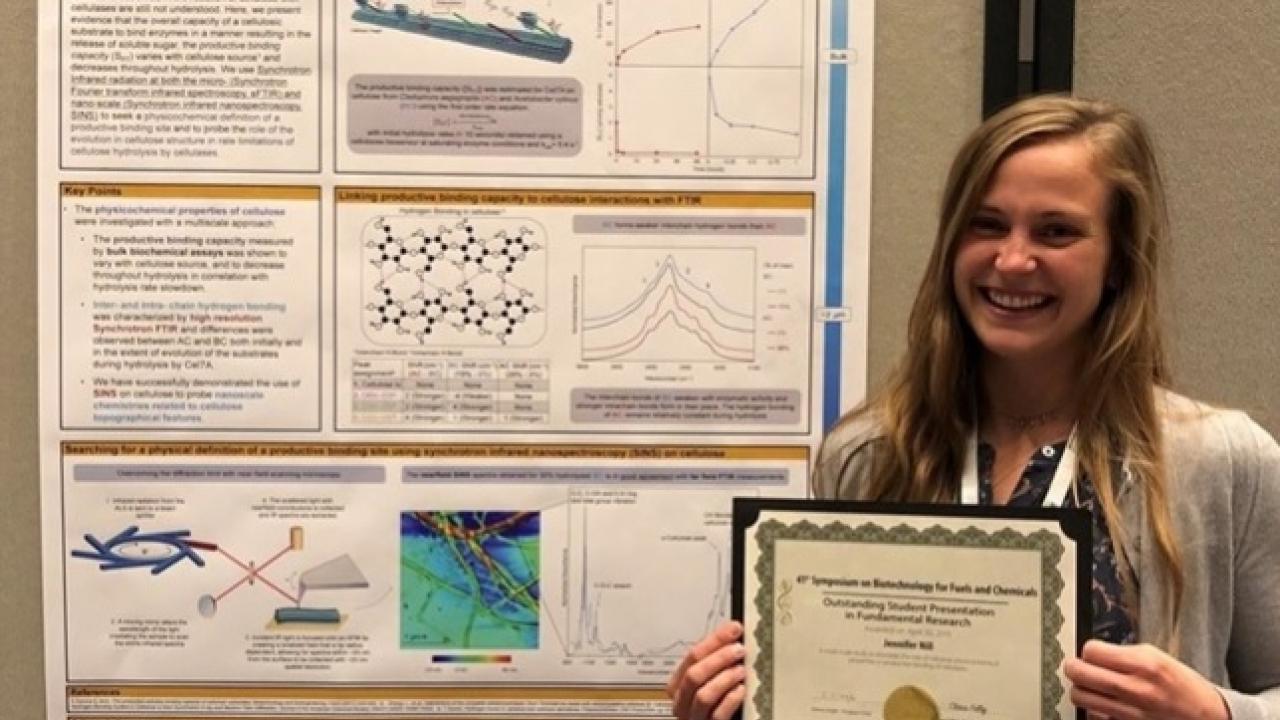
CHE Ph.D. Candidate Jennifer Nill Wins SIMB Student Poster Competition
Chemical and Biological Engineering Ph.D. candidate Jennifer Nill won the 2019 student poster competition at the Society for Industrial Microbiology and Biotechnology (SIMB)’s Symposium on Biotechnology for Fuels and Chemicals (SBFC) for her poster, “A multi-scale study to elucidate the role of cellulose physiochemical properties in productive binding of cellulases.”
The award marks the third year in a row that a UC Davis chemical engineering graduate student has won the SBFC “fundamentals research” student poster award. Nill is also now a perfect four-for-four in poster presentations in her academic career. Each poster she has presented has won an award, including two years ago at the 2017 SIMB Symposium Biotechnology for Fuels and Chemicals.
Cellulose, a polymer from plants, can be broken down into glucose molecules using specialized enzymes called cellulases. These glucose molecules can then be turned into soluble sugars that can be used to make fuel, plastics or chemicals, making cellulose a key to the next generation of sustainable biofuels. However, nature makes it difficult to break down cellulose, so scientists like Nill are looking at ways to make this easier.
One method is pre-treatment, the process of using chemicals or chemical reactions to make it easier for enzymes to access and break down cellulose. Nill uses a technique that combines infrared light and atomic force microscopy to obtain chemical and physical images of cellulose on the nanoscale to show a sample’s accessibility to enzymes.
With this and a biochemical measurement, she can measure the number of binding sites where an enzyme can attach to and break down cellulose to better understand what features of the material control how fast it can react with cellulases, as well as how factors like source and processing affect it.
Understanding cellulose will allow researchers to design pre-treatments that will help make the overall process of creating valuable materials from plants cheaper and more efficient.
“I think we need to make it easy for people to do the right thing,” she said. “If we can make it easy to be sustainable through technological advances, I think more people are going to choose that route.”
Nill, who works under associate professor Tina Jeoh in the Department of Biological and Agricultural Engineering, is wrapping up her Ph.D. this summer, though she plans to continue her work at UC Davis and in the Jeoh Lab as a postdoctoral scholar. She eventually plans to work in industry on sustainable biomaterials, particularly biodegradable plastics.
Related: https://sim.confex.com/sim/41st/meetingapp.cgi/Paper/38681
